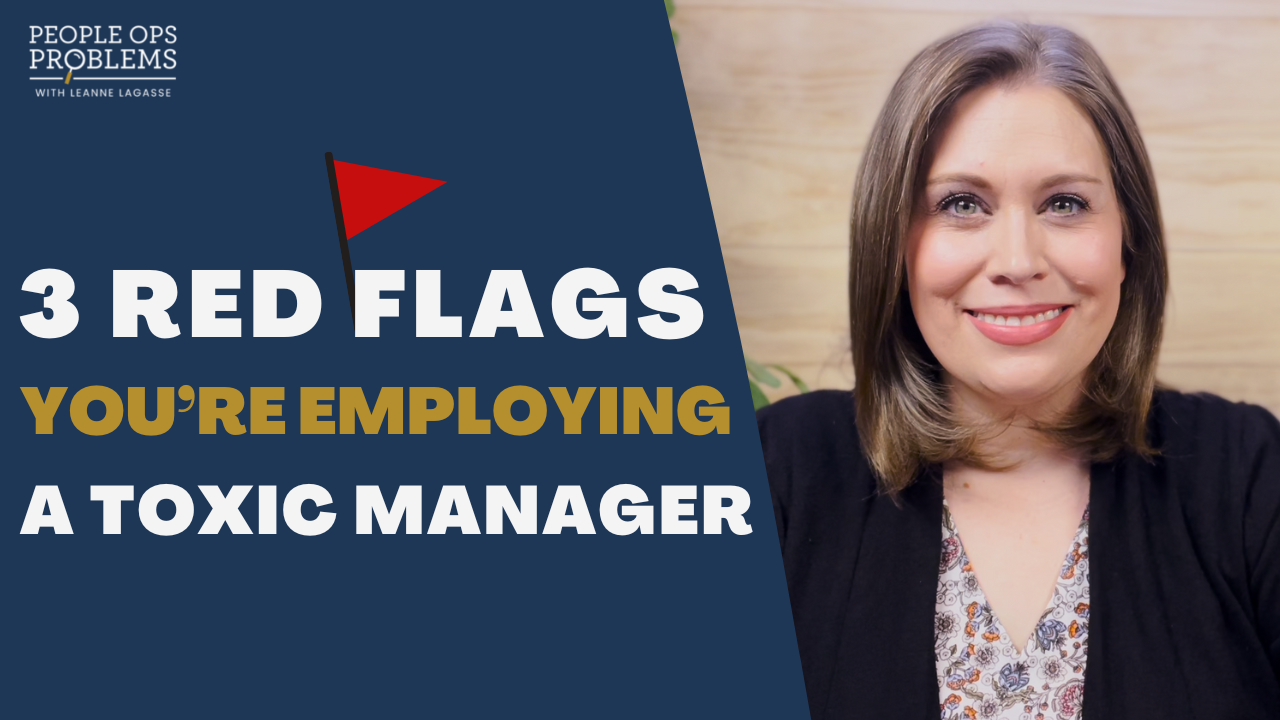3 Warning Signs of Toxic Managers

Welcome to People Ops Problems with LeAnne Lagasse, a bi-weekly video series designed to help Business and People/Culture Leaders improve employee engagement, retention, and communication with their employees. Sign up now to get it in your inbox.
“People leave managers, not companies.” It’s an expression you’ve probably heard before. But is there any truth to it?
According to Gallup’s comprehensive study, The State of the American Manager, 50 percent of employees have left a job “to get away from a manager at some point in their career.”
So, yes, unfortunately, the old adage does hold some truth.
Call it what you want – toxic management, abusive management, problematic management, or just a bad boss – poor management is a serious issue in many of our organizations, and the consequences cannot be ignored.
Toxic management is tied to lower employee engagement, retention, productivity, efficiency, team cohesion, and a whole slew of negative organizational outcomes. But more importantly, toxic management is harmful to the psychological and physical well-being of the employee.
If we want to build workplaces where our employees are thriving and flourishing, it’s crucial for us as leaders to be able to identify when we’ve got a toxic manager on our hands.
And while there are plenty of manager behaviors that most people will recognize as toxic – such as yelling, aggressive nonverbal displays, or emotional manipulation – in this week’s episode of ‘People Ops Problems,’ we’re talking about some of the lesser-known warning signs.
3 Lesser-Known Warning Signs of Toxic Managers
1. They rarely give credit to their team members. This one might surprise you. You would think that a toxic manager would want everybody to know how amazing their team is, right? But as it turns out, many toxic or problematic managers are much more interested in inflating their own egos. These leaders tend to over-exaggerate their own accomplishments – or the role they played in leading to their team’s success – while simultaneously diminishing the roles of others.
- What to watch for: When talking about his or her team, does this manager give praise and recognition to specific employees by name, especially when they aren’t present? Or do they speak in very broad terms, giving emphasis to the role THEY played to get their team to achieve a positive outcome? These would be red flags that a toxic manager is leading the team.
2. They want to play a gatekeeper role. A toxic manager will often try to play a gatekeeper role within the organization. This is all about creating barriers in order to limit access to resources or people. I have found that, in organizations where there are gatekeeping managers in place, there are very strong in-group/out-group distinctions. These managers over-emphasize the need to protect their team members and get in front of every decision in an attempt to control the outcomes. And in doing so, they stunt the growth of the team and keep individuals from advancing into more significant roles in the organization.
- What to watch for: Do you have a manager who always has a reason why a particular employee isn’t ready for a promotion? Does this person exclude employees or limit their access to information and resources? Do they have an “us against them” mentality? If you hear patterns like these in their communication, it’s often an indication that they want to play gatekeeper. Listen to the way this manager talks about his or her employees with respect to their career advancement. An exceptional leader will always want to coach and develop their team members and see them advance.
3. Their team is “manager-obsessed,” not “client- or mission-obsessed.” This one is trickier to spot and is going to require a good bit of employee listening. A team that is “manager-obsessed” instead of “client- or mission-obsessed” is constantly walking on eggshells. Because of the emotional immaturity or inconsistency of their manager, they’re always evaluating how they should engage with that person, and there’s a lot of fear and distrust at play.
- What to watch for: Does it seem like the people under this manager are overly cautious? Are they always on guard out of fear that they will be humiliated, isolated, or punished by their manager? If you’re an executive leader, these are all clues that you need to do some digging. And just a note – this is different from a team that is “obsessed” with their manager in a good way. I’m talking about people who are highly attuned to their manager because they don’t feel safe.
Our employees and our organizations deserve so much better. Going forward, I hope that you feel more equipped to identify these lesser-known warning signs, so you can hold your managers accountable and build a better workplace for all.
Hey, thanks for being here and for watching/reading. My goal is to consistently create content that's engaging, applicable, and inspires you to continue learning and growing as a leader. If you have ideas for future content or any questions at all, please shoot me an email at: [email protected].
Get My Newsletter Delivered Right to Your Inbox!
Join thousands of People + Culture Leaders investing in their growth and development each week. 🙌🏻
No spam. No selling your info. Just great content.



